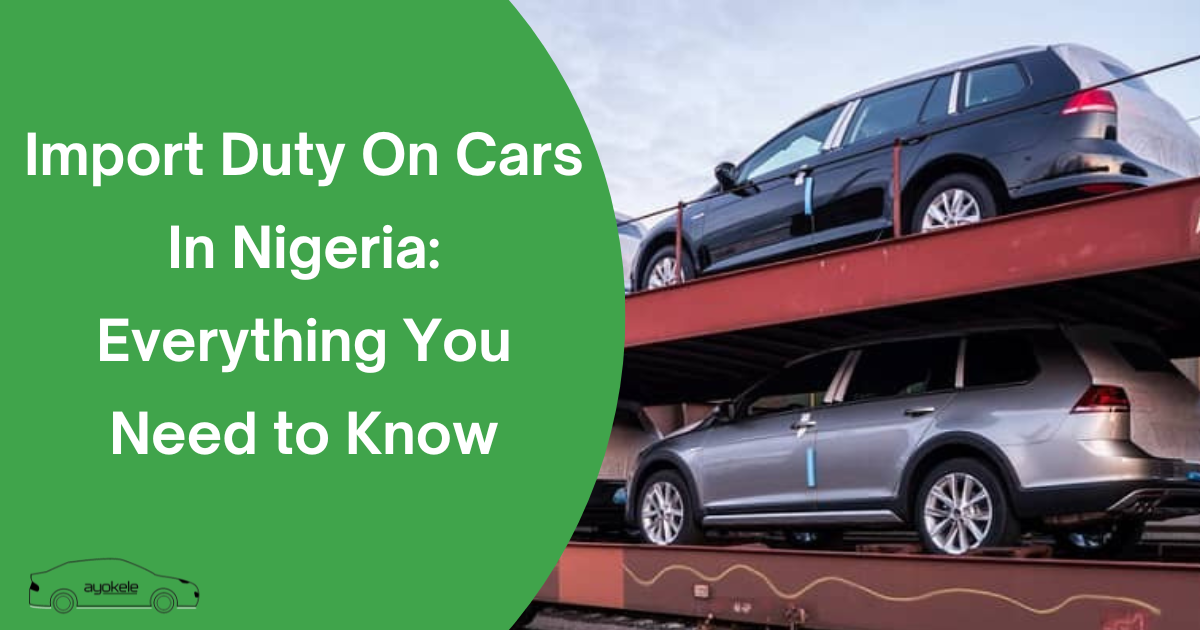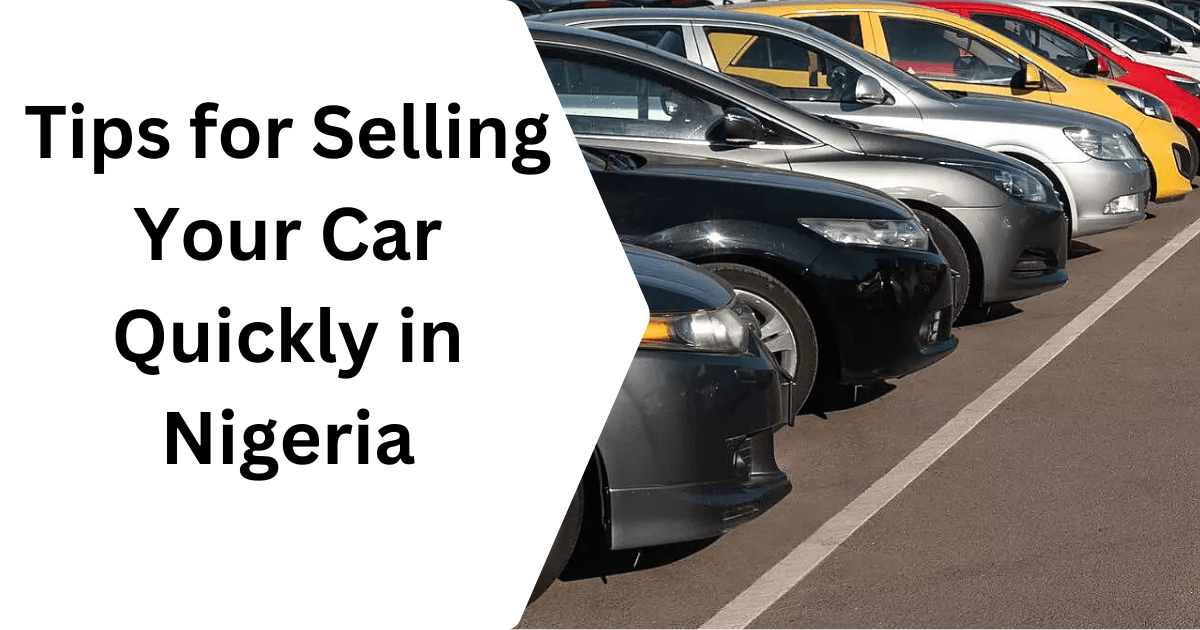Importing a car into Nigeria involves understanding various fees and regulations, with import duty being one of the most significant costs you’ll face. Whether you’re planning to import a new vehicle or a used one (commonly known as Tokunbo), knowing what you’ll need to pay can help you budget properly and avoid unexpected expenses.
The Nigerian government regulates car imports through the Nigeria Customs Service (NCS) to protect local industries and generate revenue. In recent years, these regulations have undergone several changes, affecting both duty rates and import procedures. This has made it crucial for importers, car dealers, and individual buyers to stay informed about the current rules and costs.
In this comprehensive guide, we’ll break down everything you need to know about car import duties in Nigeria. From understanding basic duty calculations to learning about additional charges and documentation requirements, we’ll guide you through the process of importing a vehicle legally and efficiently.
Understanding Import Duty Rates in Nigeria (2025 Update)
Import duty is a tax collected by the Nigeria Customs Service (NCS) when bringing a car into Nigeria. However, it’s important to know that the total amount you’ll pay isn’t just one single fee. Let’s explore the current import duty structure in Nigeria, breaking down each component to understand how it affects the total cost of importing a vehicle.
New Vehicles
The basic import duty starts at 20% of the vehicle’s value. Think of this as your foundation cost. On top of this, you’ll need to pay Value Added Tax (VAT) at 7.5% – this is calculated on the combined value of your vehicle plus the basic duty. The National Automotive Council (NAC) levy adds another 20%, designed to support local manufacturing initiatives.
For example, if you’re importing a new Toyota Camry valued at ₦10 million:
- Basic duty (20%): ₦2 million
- VAT (7.5%): ₦900,000
- NAC levy (20%): ₦2 million Additional smaller charges like ETLS (0.5%) and CISS (1%) would add ₦150,000
Used Vehicles (Tokunbo)
The structure for used vehicles is slightly more forgiving but becomes more complex with age. The fundamental difference lies in the NAC levy, which drops to 15% for used vehicles. However, age-related surcharges can quickly add up:
For a 6-year-old Toyota Camry valued at ₦5 million:
- Basic duty remains 20%: ₦1 million
- VAT stays at 7.5%: ₦450,000
- NAC levy (15%): ₦750,000
- Age surcharge (2.5% for 6-8 years): ₦125,000
Special Categories and Considerations
Commercial vehicles enjoy more favorable rates to support business operations. For instance, a delivery truck valued at ₦15 million would face:
- Reduced basic duty (10%): ₦1.5 million
- Standard VAT (7.5%): ₦1.125 million
- Lower NAC levy (5%): ₦750,000
Electric and hybrid vehicles receive special treatment to encourage environmental consciousness. For an electric vehicle worth ₦12 million:
- Reduced import duty (5%): ₦600,000
- Standard VAT (7.5%): ₦900,000
- Lower NAC levy (10%): ₦1.2 million
Remember that these duties are just part of the total import cost. You’ll also encounter:
- Port charges varying by location and duration
- Clearing agent fees typically ranging from 5-10% of duty value
- Documentation costs covering various certificates and permits
- Inspection fees based on vehicle type and age
The final duty amount in Naira depends heavily on exchange rates, as vehicle values are typically calculated in foreign currency. Always check current exchange rates from the Central Bank of Nigeria when planning your import.
Factors Affecting Import Duty in Nigeria: A Detailed Analysis
Let me walk you through all the key factors that influence how much import duty you’ll pay when bringing a vehicle into Nigeria. Understanding these factors will help you make better import decisions and anticipate costs accurately.
Vehicle Age and Its Impact
Think of vehicle age like a sliding scale that affects your duty payments. A brand-new car starts at the highest point of the scale, while older vehicles slide down with some interesting variations along the way.
For brand-new vehicles, you’re looking at the full duty rate because they hold their maximum value. These vehicles require the complete 20% duty plus the standard 20% NAC levy. As your vehicle ages, the story changes. A three-year-old car might see some reduction in its base value assessment, but once you hit the 6-year mark, additional surcharges start to apply.
Let’s look at a practical example: If you’re importing a 2022 Toyota Camry valued at ₦10 million, you’ll pay the full rates. However, the same model from 2018 might be valued at ₦7 million for duty purposes, but then face an age-related surcharge of 2.5%.
Engine Capacity: The Power Factor
Engine size plays a crucial role in determining your import duties. Think of it as a three-tier system:
Small engines (under 2.0L) represent the most economical choice. These vehicles, like a Toyota Corolla 1.8L, typically attract lower duty rates because they’re considered more fuel-efficient and environmentally friendly.
Medium engines (2.0L – 3.0L) fall into the standard category. Cars like the Honda Accord 2.4L or Toyota Camry 2.5L face normal duty rates without any special considerations.
Large engines (above 3.0L) face the highest charges. Imagine bringing in a Land Cruiser V8 – you’re looking at premium duty rates plus additional charges because these vehicles are considered luxury items.
Vehicle Type and Market Positioning
Regular passenger cars form the baseline for duty calculations. A standard Toyota Corolla or Honda Civic follows the basic duty structure without additional complications. SUVs and luxury vehicles face higher assessments. For instance, a Mercedes-Benz GLE or BMW X5 would not only be valued higher but might also attract additional luxury vehicle surcharges. Commercial vehicles, interestingly, often enjoy more favorable rates to support business operations. A 14-seater bus or delivery van might qualify for reduced duties compared to a personal vehicle of similar value.
Country of Origin Considerations
Vehicles from ECOWAS countries might benefit from regional trade agreements, potentially reducing your overall duty burden. However, you’ll need proper documentation to prove the vehicle’s origin. European imports often face standard international rates but require additional documentation proving they meet Nigerian environmental and safety standards. American imports require special consideration due to their left-hand drive configuration, while Asian imports (particularly from Japan and Korea) often have well-established import channels, making the process more straightforward.
Market Value and Economic Factors
Your vehicle’s market value serves as the foundation for all duty calculations. This value is influenced by:
- Current global market prices for similar vehicles
- Local demand and popularity of the model
- Brand reputation and resale value in Nigeria
- Special features and optional equipment
The exchange rate also plays a crucial role since import duties are calculated in Naira but based on vehicle values often quoted in foreign currencies. A fluctuation in exchange rates can significantly impact your final duty payment.
Documentation Requirements for Car Importation in Nigeria
Essential Documents for All Vehicle Imports
First, let’s understand the core documents that every importer must have, regardless of the vehicle type:
- Bill of Lading This serves as your proof of ownership and shipping contract. Think of it as your vehicle’s passport during transit. It must clearly show:
- Your name as the consignee
- Complete vehicle details including VIN number
- Port of origin and destination
- Shipping date and expected arrival
- Purchase Invoice: This document proves how much you paid for the vehicle. It needs to include:
- Seller’s complete details
- Vehicle’s full description
- Purchase price
- Date of purchase
- Payment terms
- Any special conditions of sale
- Form M: This is your official import declaration to the Central Bank of Nigeria. You’ll need:
- A valid e-Form M number
- Proper categorization of your import
- Correct HS Code for your vehicle type
- Complete supplier information
Vehicle-Specific Documentation
Different types of vehicles require additional specific documents:
For New Vehicles:
- Manufacturer’s certificate of origin
- Factory sticker showing vehicle specifications
- New vehicle invoice from the dealer
- Certificate of Conformity (COC)
For Used Vehicles:
- Previous registration documents
- Deregistration certificate from country of origin
- Vehicle title
- Service history (if available)
- Roadworthiness certificate
Customs Clearance Documents
When your vehicle arrives, you’ll need these documents for customs clearance:
- PAAR (Pre-Arrival Assessment Report): This document shows:
- Assessed value of your vehicle
- Expected duty payable
- Vehicle classification
- Import guidelines compliance
- SGD (Single Goods Declaration) Contains:
- Detailed description of the vehicle
- Value declaration
- Duty calculation
- Importer’s declaration
Additional Required Certificates
Don’t forget these important certificates:
- Clean CRI (Clean Report of Inspection) Shows that your vehicle:
- Meets Nigerian standards
- Has passed physical inspection
- Complies with age restrictions
- SONCAP Certificate Proves your vehicle meets:
- Safety standards
- Environmental requirements
- Technical specifications
Bank Documents
To complete your import, you’ll need:
- Evidence of payment through approved channels
- Foreign exchange allocation documents
- Bank receipts for duty payments
- Transaction history
Special Cases
For certain situations, you might need additional documentation:
For Commercial Vehicles:
- Business registration documents
- Transport operator’s license
- Route permit applications
- Special purpose vehicle certificates
For Diplomatic Vehicles:
- Diplomatic clearance documents
- Embassy endorsement letters
- Duty exemption certificates
- Special permit applications
Remember that all documents must be:
- Original or properly certified copies
- Written in English or officially translated
- Not more than six months old
- Free from alterations or erasures
Tips for Importing Cars into Nigeria
Before you start the import process, take time to research the market thoroughly. Think of this like planning a major investment – because that’s exactly what it is. You’ll want to understand which cars have good resale value in Nigeria, which models are easier to maintain, and which ones might face challenges with spare parts availability.
Consider popular brands like Toyota, Honda, and Hyundai, which have established themselves in the Nigerian market. These vehicles often retain their value better and have readily available spare parts. For instance, a Toyota Camry might be a better import choice than a less common brand, even if the initial purchase price is slightly higher.
Choosing Your Source Market
When importing from Europe, you’ll find many high-quality used vehicles, but remember that these cars often come with higher specification levels that might increase your import duties. Japanese imports, on the other hand, often offer excellent value for money, though you’ll need to consider the right-hand drive to left-hand drive conversion costs where applicable.
United States imports can be attractive due to lower initial purchase prices, but be cautious about salvage titles and flood-damaged vehicles. Always verify the vehicle’s history using services like Carfax or AutoCheck before making a purchase.
Working with Reliable Partners
First, look for licensed clearing agents with proven track records. Ask for recommendations from successful importers and verify their licenses with the Nigeria Customs Service. A good agent should be able to:
- Explain the entire process clearly
- Provide accurate cost estimates upfront
- Handle documentation professionally
- Have established relationships with port authorities
Cost Management Strategies
Time your imports wisely. Port charges accumulate daily, so having all your documentation ready before the vehicle arrives can save significant money. Plan for about 7-14 days for clearance to avoid excessive storage charges.
Consider groupage shipping where possible. This means combining your vehicle shipment with others to share container costs. While this might take longer, it can reduce your shipping expenses considerably.
Building Long-term Relationships
If you plan to import vehicles regularly, invest time in building relationships with:
- Reliable suppliers in source countries
- Trusted shipping companies
- Experienced clearing agents
- Bank officers handling foreign exchange
- Customs officials
These relationships can help streamline future imports and provide early warnings about policy changes or market shifts.
Frequently Asked Questions About Car Importation in Nigeria
How long does the entire import process typically take?
The process usually takes 4-6 weeks from purchase to delivery. This includes shipping time (2-3 weeks), port clearance (7-14 days), and documentation processing. However, delays can occur due to port congestion or documentation issues.
Can I import any car I want into Nigeria?
No, Nigeria has specific restrictions. Cars must be less than 12 years old from the year of manufacture. Additionally, certain vehicle types, like right-hand drive vehicles, are prohibited.
Is it cheaper to import directly or buy from local dealers?
Importing directly can be cheaper, but it comes with more risks and responsibilities. Local dealers handle all import hassles but charge a premium for their services. Your choice should depend on your knowledge of the import process and risk tolerance.
How can I calculate the total import cost before starting the process?
The total cost typically includes:
- Purchase price of the vehicle
- Shipping costs (15-20% of car value)
- Import duty (20% of vehicle value)
- VAT (7.5%)
- NAC levy (15-20%)
- Port charges and clearing fees Use these percentages for a rough estimate, but actual costs may vary.
Are there any hidden costs I should know about?
Yes, some often-overlooked costs include:
- Storage fees if clearance takes longer than expected
- Insurance during shipping and port handling
- Currency conversion fees
- Local transportation from port to destination
- Agent fees for documentation processing.




